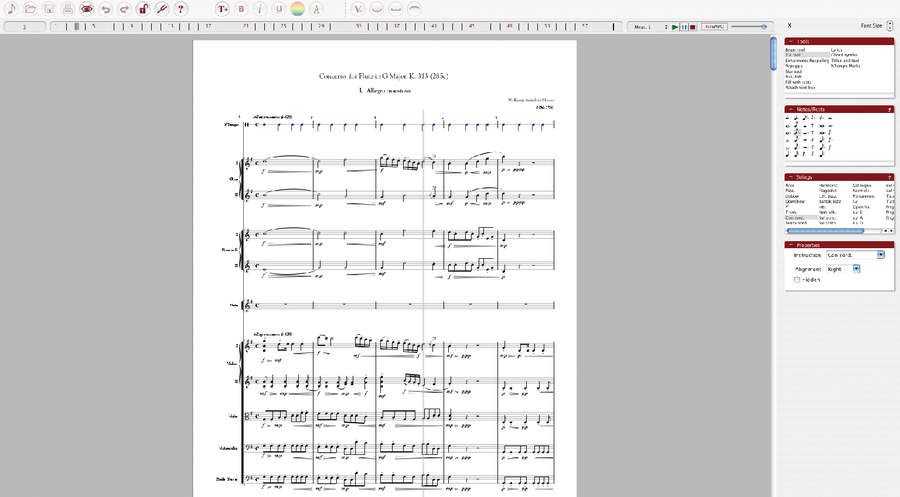MusicRadar Verdict
For a self-contained, notation-based music program with performance capabilities, it could be all you need.
Pros
- +
Handy, all-in-one composition solution. Expandable sound library. Online score library shop. MIDI entry in step time.
Cons
- -
Core sound set may be too limited for some. Underwhelming real-time MIDI input. No MIDI export.
MusicRadar's got your back
In these high-tech days of instant musical gratification, the concept of patiently writing out your musical thoughts in manuscript for someone else to play seems almost prehistoric.
And yet if you want to communicate your musical ideas to a band of regular orchestral players, that's precisely what they'll expect you to do.
For some time now, the two leading software applications designed for this purpose have been Sibelius and Finale.
But while these mainstays have become increasingly complex, a more focused program, Notion, has been introduced to the market.
Now at version 2.0, this Mac and PC progam offers a completely self-contained route to building traditional scores from scratch, with the added bonus of hearing them played back via an included orchestral sample bank that was performed by the London Symphony Orchestra at Abbey Road Studios.
Overview
In a nutshell, Notion 2.0 comprises a score-based sequencer, a sample playback engine and an integrated sample library.
The sound library covers all the typical orchestral instruments, from strings and winds to brass and percussion, including piano.
Want all the hottest music and gear news, reviews, deals, features and more, direct to your inbox? Sign up here.
However, extra sample sets are also available, covering more bespoke instrumental articulations and solo styles. In addition to fresh composition, Notion's other great feature is its ever-expanding online score library (using its proprietary NTN file format), making it a great 'accompaniment' tool.
And, of course, all your work can be printed out, ready for the players to work from.
All pretty simple, but you'll notice that so far we've not mentioned MIDI, sample player formats, plug-ins or audio recording. This is because Notion's self-contained design neatly sidesteps most of these issues.
However, concessions to compatibility include MusicXML format support and MIDI file import.
Real-time and step MIDI keyboard input is also present, although to be honest we found this aspect frustrating to use and more about note 'entering' than playing.
Furthermore, MIDI file export isn't supported, which is an annoyance.
In use
Writing in Notion can be done in a number of ways (including step input using MIDI).
However, the first thing to do is to set up a score, choosing your instrumentation, time signature, key signature, etc. Thankfully, a bunch of handy templates are included to get you started.
Because Notion's score, instrumentation and playback are fully integrated from the outset, it's then simply a case of composing your parts using notes, rests, articulations, and so on.
The way this works is that Notion has two cursor formats - a standard pointer and a music cursor - which you toggle between using the Esc key.
With the music cursor enabled, you can pick up items from the drop-down sidebar menu to the right and then position them in your score.
Alternatively, there's an extensive printed list of key commands and a handy quick reference guide.
Given the potential complexity of a musical score, it's no surprise that the sidebar includes a lot of functions, ranging from simple notes and rests to dynamics marks (m, crescendo, and so on), articulations (such as staccato), slur, tie and beam tools, repeats and pedal markings.
On top of that lot, you've also got the option to type in text, add lyrics, include chord symbols, and, of course, tempo markings.
If this feels like rather a lot to get to grips with, remember that Notion can play what you write, and even includes a performance mode (see the High performance boxout below for more on this), so there's always audio feedback available if you want it.
Focused on scoring
Notion steers clear of the traditional 'sequencer with plug-ins' approach, with the assumption that if you get your scoring right, you won't need to rebalance things.
Even so, it does include a basic audio mixer, with level, pan, decay control, solo and mute for each instrument. But that's all you get on the mixing front and you certainly won't find any audio plug-in support.
Something else to be aware of is that Notion requires a certain degree of musical notation knowledge.
This isn't a limitation as such, as it's only to be expected, but if you're a complete novice, the advice would have to be to get some theory training first.
That said, Notion is cleverly designed to help you get things looking right, and certain automatic functions (auto-rest creation and bar-exceed indicators, for example) help immensely as you compose.
All in all, Notion is a niche product, much more focused than its competitors, Finale and Sibelius. It makes you think in a different way to an audio/MIDI sequencer, and has fewer distractions, which can be really refreshing.
The included core sample library is good to get started with, but we suspect that anyone using the application extensively will want to invest in a few of the expansion packs, if only to get more realistic articulations or expand the repertoire of solo instruments.
What's more, we feel that Notion is a tool to be used alongside real players, rather than one to replace them (as a deluxe sample library might), with the NTempo feature in particular making it highly appropriate for this.
Overall, Notion remains an excellent tool for the budding composer, and the developers have made some big improvements in this latest version.
Computer Music magazine is the world’s best selling publication dedicated solely to making great music with your Mac or PC computer. Each issue it brings its lucky readers the best in cutting-edge tutorials, need-to-know, expert software reviews and even all the tools you actually need to make great music today, courtesy of our legendary CM Plugin Suite.

